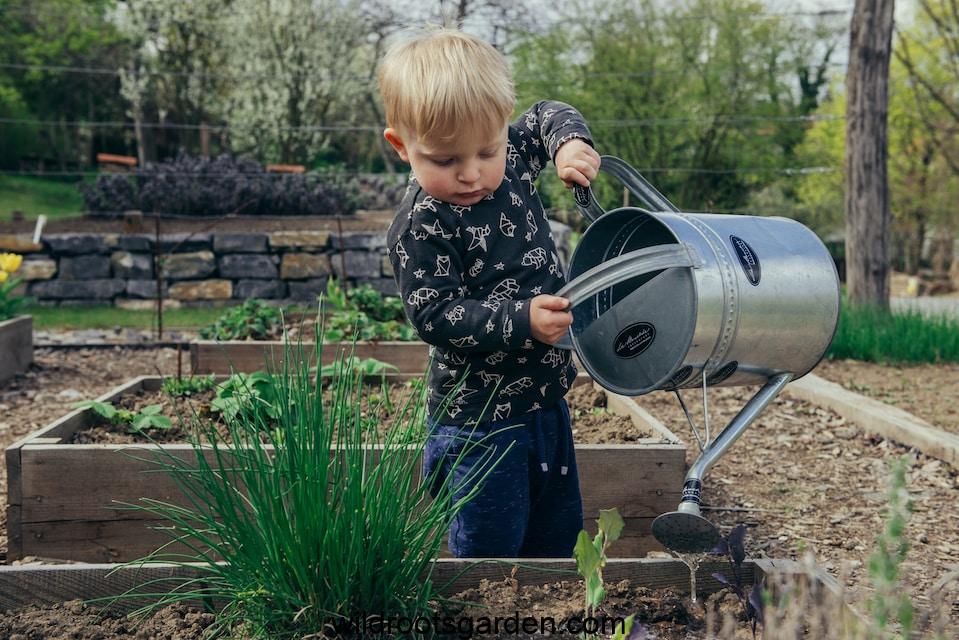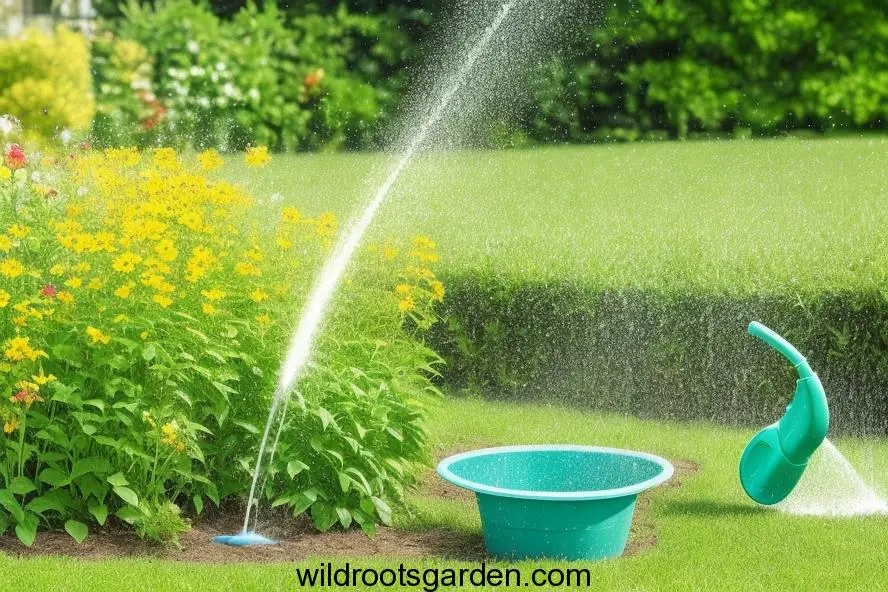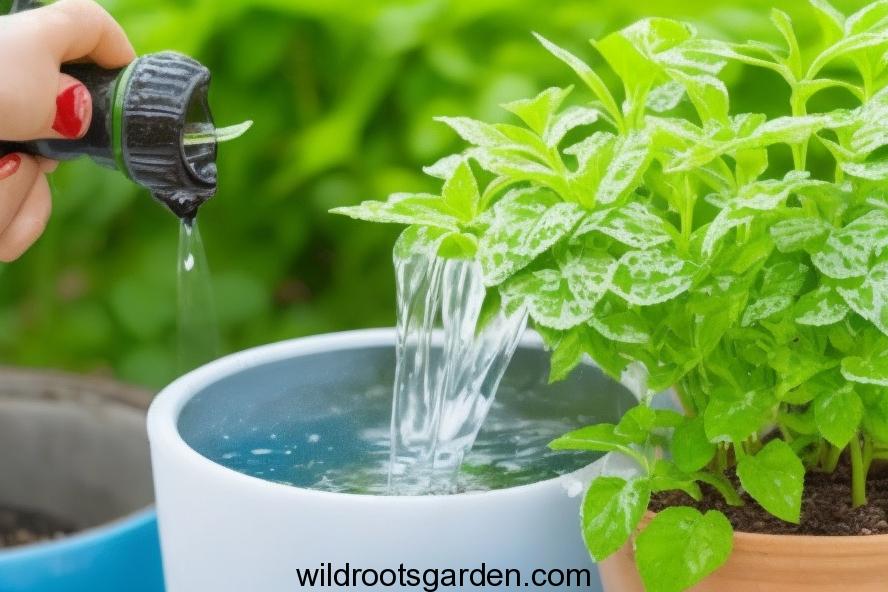Accidentally Water Your Plants with Cold Water can stress them out, but there’s no need to panic. Here’s how to help them recover:
Plants may endure shock when exposed to cold water, especially if the water is much colder than the surrounding air. Root growth and nutrient intake can be hampered by cold water, which can result in delayed development and worsen general health. Moreover, some plant species are more vulnerable to cold water damage, particularly tropical kinds adapted to warmer regions. Moreover, a fast drop in temperature can cause leaves to wilt or turn yellow.
Understanding the impact of using cold water on your plants is crucial for maintaining their vitality. By being mindful of water temperature and making adjustments accordingly, you can continue to foster a thriving and vibrant garden.
Immediate Damage Control:
- Stop watering: Don’t add more cold water to the shock.
- Warm the soil: If possible, gently place the pot in a warm, sunny spot to help raise the soil temperature slowly. Avoid sudden temperature changes.
Recovery Steps:
- Monitor closely: Observe your plants for the next few days. Look for signs of stress like drooping leaves, wilting, or leaf discoloration.
- Water properly: Resume watering when the soil feels dry to the touch, but use lukewarm or room-temperature water this time.
- Increase humidity: Misting the leaves with lukewarm water can help reduce stress and encourage transpiration.
- Avoid fertilizers: Hold off on fertilizing for a week or two, as stressed plants are more susceptible to fertilizer burn.
Preventing Future Cold Shocks:
- Leave tap water to sit: Let fresh tap water sit out for at least a few hours before watering, giving it time to reach room temperature.
- Collect rainwater: Rainwater is naturally lukewarm and perfect for your plants.
- Water in the morning: Watering in the morning allows the soil to warm up throughout the day, minimizing the temperature difference.
Remember:
- The severity of the impact depends on several factors: the plant variety, how cold the water was, and the overall health of the plant. Some plants are more sensitive than others.
- Recovery is possible: While some leaves may drop or show damage, healthy plants can usually bounce back with proper care.
Effects of Cold Water on Plants

Plants endure temperature shock when they are placed in cold water. Similar to humans, plants enjoy a consistent climate, and abrupt temperature changes can stress them out. Moreover, the absorption of nutrients is hampered by cold water, which may result in nutrient shortages and delayed growth. These negative consequences may eventually cause plants to develop more slowly.
Signs of Cold Water Damage
If your plants have been exposed to cold water, certain signs may indicate damage. Wilting leaves are a common occurrence, as cold water restricts the flow of fluids within the plant. Yellowing foliage may also indicate nutrient absorption problems. In severe cases, plants may shed leaves altogether.
Preventing Cold Water Mishaps
Check the water temperature before watering to avoid accidentally using cold water. Most plants may usually be watered at room temperature without any problems. Moreover, think about watering your plants at the right time of day when it’s cooler.
Treating Cold Water Damage
If your plants have been harmed by cold water, assist them to recover gradually. Translocate the plants to a warmer area to gradually warm them. To give the plants time to heal and regain their strength, alter the watering schedule. Using fertilizers can help by supplying the nutrients required for recuperation.
Understanding Plant Watering Needs

Various plants require different amounts of water. The type of plant, its size, and its habitat all affect how much water it needs. Learn about the individual watering requirements of your plants and modify your care as necessary to keep them healthy.
Common Myths About Plant Watering
There are many misconceptions about watering plants. One typical misunderstanding is that using cold water can increase plant health, but as we’ve shown, this is not always the case. Another misconception is that hot water is bad for plants. While this can occasionally be true, gently warm water can be advantageous. Equally untrue is the idea that watering in the evening prevents prolonged leaf wetness, which raises the danger of fungus illnesses.
Proper Plant Watering Techniques
The proper irrigation methods must be used if you want healthy plants. Many indoor plants receive frequent recommendations for the soak and dry procedure. By watering the plant from the base, you can prevent overwetting the foliage. Overwatering should be avoided as it might cause root rot and other issues.
Importance of Consistency in Plant Care
Creating a consistent watering routine is beneficial for plants. Observing your plants regularly allows you to identify any issues early on. Consistency in care helps plants thrive and minimizes the risk of damage due to temperature fluctuations.
Effects of Overwatering vs. Underwatering
It’s crucial to comprehend the differences between underwatering and overwatering. Underwatering can result in dehydration and withering while overwatering can suffocate the roots and cause root rot. Maintaining healthy plant growth requires balancing watering practices.
Watering Plants in Different Seasons
Watering requirements change with the seasons. During spring and summer, plants may need more frequent watering due to higher temperatures and increased growth. In contrast, fall and winter necessitate less watering to avoid waterlogged soil.
Choosing the Right Watering Tools

The process can be more effectively completed by choosing the right watering equipment. While drip irrigation and sprinklers are appropriate for larger outdoor areas, watering cans are practical for inside plants.
Water Quality and Its Impact on Plants
The quality of water used can also influence plant health. Tap water often contains chlorine and other chemicals that can affect plants negatively. Using filtered water or rainwater can be a better option.
Impact of Water Temperature on Different Plant Types
Different plant species have varying sensitivities to water temperature. Tropical plants, for example, may suffer more from exposure to cold water than hardier species. Understanding your plants’ needs based on their natural habitat is crucial for providing appropriate care.
Wrap UP
it is important to remember that plants are resilient and can recover with proper care, despite the potential negative effects of mistakenly watering them with cold water. Always use water that is at or close to room temperature to prevent any harm, particularly during colder seasons.
With a little TLC and patience, your cold-watered plants should be back to their thriving selves in no time. And remember, learning from our mistakes is part of the gardening journey!
If you have any concerns about your plants’ health after a cold water incident, don’t hesitate to reach out to a local nursery or expert for advice.
FAQs About Accidentally Water Your Plants with Cold Water?
Can I use ice-cold water on my plants during hot weather?
It is not recommended to use ice-cold water on your plants, especially during hot weather. Cold water can shock the plants and impede nutrient absorption.
What should I do if I accidentally water my plants with cold water?
If you accidentally watered your plants with cold water, move them to a warmer location and adjust the watering schedule to allow them to recover gradually.
Can using hot water on plants be beneficial?
In some cases, mildly warm water can be beneficial for plants as it aids in nutrient absorption. However, extremely hot water can harm the plants.
Should I water my plants in the evening?
Watering in the evening is not always ideal, as it can lead to prolonged leaf wetness, increasing the risk of fungal diseases. Watering in the morning is generally better.
Can overwatering kill my plants?
Yes, overwatering can lead to root rot and suffocate the roots, ultimately causing the plant to die.

